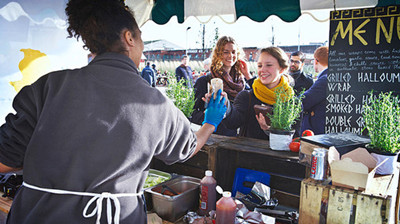街頭小食
Sandwich spread
三明治醬
The rise of decent outdoor dining
體面戶外餐飲的興起
ON A cold, blustery morning at Canary Wharf, London's second financial district, eating outside does not seem appealing. Yet on a solitary concrete quay, suited workers huddle around picnic benches. Half a dozen food stalls line the water's edge. One sells Thai food out of a rickshaw, another salted pork buns from a converted horse box. Everything on offer is about6 (10). Such is the latest in Britain's culinary evolution.
寒風(fēng)凜冽的早晨,在倫敦第二大金融區(qū)—金絲雀碼頭來份戶外早餐看起來可一點都不吸引人。然而在一個偏僻的水泥碼頭上,穿著工作服的職員們卻圍在了野餐長凳邊。沿著水岸有半打的小吃攤。其中一個小販在小車?yán)锸圪u著泰式料理,另一個在改裝的火車廂里往鮮肉包上撒著鹽。這些售賣的食物價格大約都在6英鎊(10美元)左右。這就是英國餐飲的新興潮流。

Street dining is hardly new. Kebab vans in university towns serve oily gunk to sozzled students; on weekends in London, grizzled men hawk frankfurters outside Tube stations. But until recently smarter nosh was mostly available only in restaurants. Now most big cities have at least one regular street food event, as a London fashion has spread out.
街頭餐飲并不是新鮮事物。大學(xué)城里的小吃攤向閑逛的學(xué)生們兜售油炸小食。周末的倫敦,頭發(fā)花白的男人在地鐵站外叫賣法蘭克福香腸。但直到最近,精致的小點心大多都只在餐廳供應(yīng)。隨著倫敦潮流的擴(kuò)散,現(xiàn)在大多數(shù)大城市都至少有一次定期的小吃美食節(jié)。
Britain's faltering economy is part of the explanation. “In a recession, people go into food businesses”, says Mark Laurie of NCASS, a trade association for caterers. Setting up a street food stall takes little capital or specialist knowledge. At Canary Wharf, the traders include a former architect and a bank worker, as well as restaurateurs. Demand is increasing, too, as pinched customers trade down from restaurants.
英國搖搖欲墜的經(jīng)濟(jì)是促成這一現(xiàn)象的部分原因。“在經(jīng)濟(jì)衰退期,人們會轉(zhuǎn)向餐飲行業(yè)。”來自NCASS(Nationwide Caterers Association,國際餐飲聯(lián)盟)的馬克·勞里說。一個街頭小吃攤只需少量資金和專業(yè)知識。在金絲雀碼頭,小商販不僅包括餐館老板,還包括一名前建筑師以及一名前銀行職員。囊中羞澀的消費(fèi)者們將消費(fèi)由餐廳轉(zhuǎn)向街頭美食,需求也在擴(kuò)大。
Yet the biggest driver of outdoor eating is officialdom. Local authorities and commercial property developers see street stalls as a means of quickly gingering up struggling high streets and sterile plazas. The Canary Wharf Group does not charge for the use of its land by the cluster of street vendors (the market is organised by Kerb, a profit-making firm). Alistair Turnham, who runs Stock Mkt, a similar outfit, says some councils will even pay his firm to run events. Street food vendors thus avoid paying hefty rents or business rates—which helps them to undercut restaurants.
然而推動戶外餐飲發(fā)展的最大動力來自官方。地方機(jī)構(gòu)和商業(yè)地產(chǎn)開發(fā)商們將街頭小吃攤看做迅速為不景氣的商業(yè)街和冷清的廣場帶來人氣的方法。金絲雀碼頭集團(tuán)并不向街頭小販們收取攤位使用費(fèi)(這一市場由一家盈利公司Kerb組織)。運(yùn)營著一家類似機(jī)構(gòu)Stock Mkt的阿里斯泰爾·特南說一些地方委員會甚至?xí)蛡蛩墓緛磉\(yùn)營類似的活動。路邊的小吃攤因此也避免了繳納高昂的租金和營業(yè)稅,這使得他們能以低于餐廳的價格出售食品。
Still, the distinction between indoor and outdoor food is blurring. The Marriot, an upmarket hotel in Mayfair, recently put on a street food-inspired menu. Trinity Leeds, a new shopping centre in Yorkshire, hosts rolling street food traders as part of its food hall. Some successful street food vendors are setting up restaurants—few want to work out of vans forever. Others are moving into catering for private events. The market economy is triumphing.
室內(nèi)餐飲和戶外餐飲的區(qū)別還不是很明顯。萬豪酒店,一家位于梅費(fèi)爾(倫敦西區(qū)高級住宅區(qū))的高級酒店,最近推出了以街頭小吃為靈感的新菜單。位于約克郡一個新購物中心—三一·利茲,將流動街頭小吃引進(jìn)了食品大廳。一些成功的街頭小吃攤主正在籌備開餐廳—沒有多少人想一輩子都在小攤里工作。另一些人正轉(zhuǎn)向為私人宴會提供餐飲。市場經(jīng)濟(jì)大獲全勝。譯者:王穎 校對:周洋












